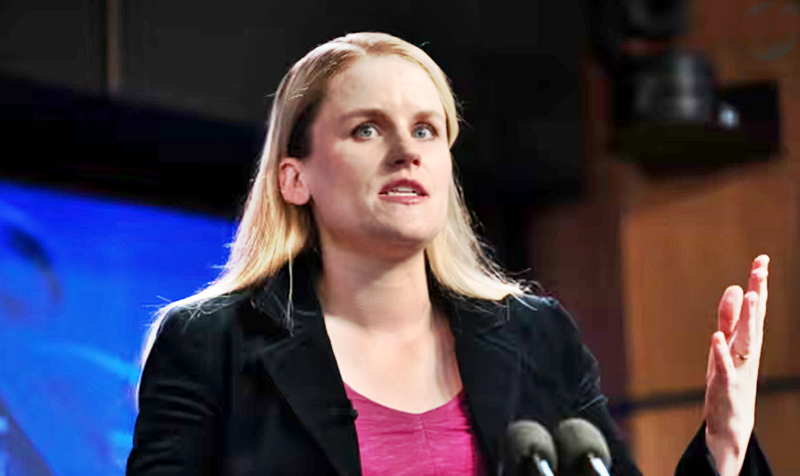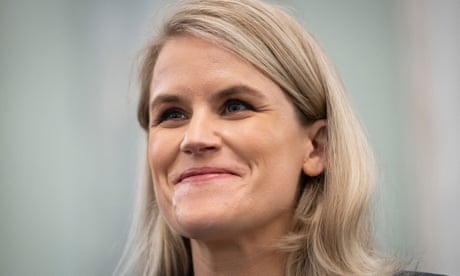Meta has ‘heard the message’ from Trump, says whistleblower Frances Haugen

By Guardian - Dan Milmo /Robert Booth -Thu 9 Jan 2025 14.09 GMT
Mark Zuckerberg has “heard the message” from Donald Trump on restricting online content and his Meta platforms will intervene “less and less” on users during the president-elect’s administration, according to the whistleblower Frances Haugen.
Haugen, who revealed the Facebook and Instagram owner’s struggles with user safety in 2021, said the US president-elect thought “the right way to run social media is with no restrictions”.

Zuckerberg’s announcement on Tuesday that Meta was dropping third-party factcheckers in the US and making other moderation changes reflected this view, she added.
“The announcement from Mark is him basically saying: ‘Hey I heard the message, we will not intervene in the United States,’” said Haugen.
Announcing the changes on Tuesday, Zuckerberg said he would “work with President Trump” on pushing back against governments seeking to “censor more”, pointing to Latin America, China and Europe, where the UK and EU have introduced online safety legislation.
Haugen also raised concern over the effect on Facebook’s safety standards in the global south. In 2018 the United Nations said Facebook had played a “determining role” in spreading hate speech against Rohingya Muslims, who were the victims of a genocide in Myanmar.
“What happens if another Myanmar starts spiralling up again?” Haugen said. “Is the Trump state department going to call Facebook? Does Facebook have to fear any consequences from doing a bad job?”
The co-chair of Meta’s oversight board has told the Guardian the arms-length body will protect human rights, as it examines Meta’s controversial content moderation policy changes.
Michael McConnell, the director of the constitutional law center at Stanford law school, said that after Meta’s decision to scrap some factcheckers and loosen its “hateful conduct” policies, the oversight board was the only institution with the authority to “review high-level, controversial content moderation decisions and make impactful recommendations that enhance the user experience for billions worldwide, promote free speech, and protect human rights”.
He spoke after one his co-chairs, the former Danish prime minister Helle Thorning-Schmidt, admitted there were “huge problems” with Zuckerberg’s announcements, and raised concern about the rights of LGBTQ+ and trans people’s rights and the potential for real-life harm.
Zuckerberg said there was “a lot of illegal stuff” that still needed to be removed from his platforms such as child exploitation and drugs-related content, but that Meta was determined to restore “free expression”.
Also on Wednesday, the UK far-right monitoring group Hope Not Hate said it expected to see “a dramatic increase in toxic content” on Meta platforms, with the changes likely to make it easier for far-right groups to coordinate local activity of the kind that fuelled the August riots in England. It called for Labour to strengthen online safety laws after Meta’s moves, warning: “We have seen time and again [that incendiary online content] is having a really violent effect on our streets.”
Haugen, who worked on the company’s civic integrity team, which focused on issues related to elections worldwide, said Trump did not want the Maga movement’s use of social media to be curtailed by one of the internet’s most powerful companies. She cited an internal Facebook report in 2021 that said the company had failed to prevent the “Stop the Steal” movement from using the platform to discredit the 2020 presidential election result and incite the 6 January 2021 riot in Washington.
“What Trump wants is for Facebook to step back and not intervene, because Maga knows how to rile up social media. And so it’s not just about content; it’s about behaviour, too,” she said.
“Trump has made very clear that the only consequences he will bring to Facebook are for Facebook acting [on content and behaviour]. We should expect Facebook to progressively act less and less.”
On Wednesday Maria Ressa, who won the Nobel peace prize in 2021 for her work as a journalist in the Philippines, said Meta’s moderation changes meant “extremely dangerous times” lay ahead for journalism, democracy and social media users.
Haugen has launched a non-profit group dedicated to tackling social media harms and advises on social media at Issue One, a non-profit focusing on electoral and political integrity. Haugen said she did not think more content moderation at Meta was the answer, however. She said the company should focus more on adjusting the algorithms that served content to users and being transparent about how those algorithms worked.
“They’re kind of doing the worst of all worlds. They’re not doing any of those actual holistic changes, and they’re cutting what little safety systems they did have,” she said.
Meta has been contacted for comment.
